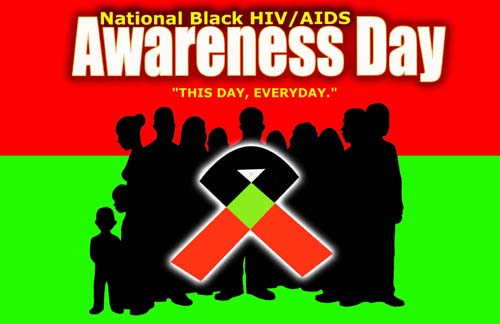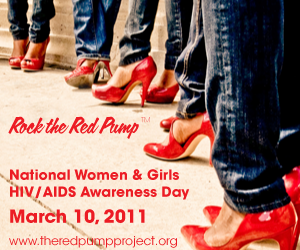 Feb. 7, 2011 We interrupt this series on the Power of Play to bring you an important public service announcement on behalf of National Black HIV/AIDS Awareness Day today. (Yep, just think of this as Superbowl Ads for nonprofits)
Feb. 7, 2011 We interrupt this series on the Power of Play to bring you an important public service announcement on behalf of National Black HIV/AIDS Awareness Day today. (Yep, just think of this as Superbowl Ads for nonprofits)
“Black teens (ages 13–19) represent only 15% of all teenagers in the U.S. but are 68% of new AIDS cases among teens,” reports The Red Pump Project (who focuses on the impact of HIV/AIDS on women and girls)
That stat on the teenagers left me spewing my coffee this morning, and immediately made me toggle my brain queue for how to best get the word out to teens about the April 1 & 2, 2011 public health conference SexTech.org in San Francisco, since so many of these topics will be covered with SOLUTIONS-BASED suggestions for championing change.
Last year about this time I wrote “Teens & Public Health Converge” reporting about SexTech (what it is, and what it isn’t) since the name alone can conjure some distorted visions and confusion. Important resources in mHealth innovations, mapping technology and anonymity used for HIV/AIDS and STD prevention help direct teens to clinics, testing, health care information and beyond…so today I thought I’d lob a few links into the ‘twitter stream’ for RESOURCES to combat these4 staggering stats.
 Here’s an excerpt from my interview with the head of ISIS/SexTech, Deb Levine, who addresses the “what are you teaching our kids?” question with aplomb…
Here’s an excerpt from my interview with the head of ISIS/SexTech, Deb Levine, who addresses the “what are you teaching our kids?” question with aplomb…
She also sheds BRIGHT light on positive new uses of technology and anonymity when it comes to HIV/AIDS prevention, particularly with this target market of teens…
Amy Jussel, Shaping Youth: The internet has become a huge ‘peer educator’ for sexual health and wellness, with over 50% of youth using web resources…is it all about the anonymity or what makes the digital realm so compelling?
Do you feel mobile and mHealth is the platform of choice to get the teen public health/prevention info out there?
Deb Levine, ISIS/SexTech: A lot of our work in the digital realm has used the best of technology where it makes the most sense…Like with mobile mapping to give accurate free clinic locations for HIV or texting to local referral sites from STDtest.org or SMS text advice from our sexINFO program (now sex info/life advice via text called HookUpwhere we get everything from curiosity to crisis concerns) or inSPOT to inform…
The anonymity DOES help youth access accurate resources…as we’ve proven in our 2008 study with Ypulse, YouthNoise and PeanutLabs, teens don’t always know how to source reliable health and wellness data fast…We want to fill that gap, and we’ll do so wherever we can.
Amy Jussel, Shaping Youth: How would you respond to parents who say SexTech/mobile resources usurps their parental agency? (e.g. offers a workaround outside of parental radar, etc. like this NYT article “When the Cellphone Teaches Sex Education”)
Deb Levine, ISIS/SexTech: Well, that’s definitely the area of push back..the question of “What are you telling our kids?”
Most of that is fear-based, because there’s good info and bad out there and adults have their OWN fear about the resources online, so we need to start by educating the adults for reassurance that the knowledge on these sites comes from professionals and the advice is culturally appropriate.
Parents often don’t really want to acknowledge their child’s sexuality to begin with, and kids actually DO want information from a trusted adult over peers studies have show, so the online resources give kids a safe place to turn to, and the anonymity helps them ask the tough questions they may not feel comfortable sharing.
ISIS encourages parents and youth to use technology together to learn about sexual health. For instance, parents can sit with their teens and search the Web together. It’s an opportunity for media literacy – together they can see who created the website (academic, commercial, individual, etc.) and discover how to identify the “good stuff”/accurate information. We offer many tips like this at Sex::Tech, as well as a reduced registration fee for adults who attend the conference together with a youth, and many parent-child teams take advantage of this every year.
Ultimately, we know the perceived anonymity of the computer screen, widgets, apps and social media platforms provide an opportunity for curating helpful content to reach kids where they are, to keep them safe, healthy and informed.
(For more of my interview with Deb Levine of ISIS, see resource list below and also click here)
I’m looking at more stats in the #BlackAidsDay tweet stream today citing:
“Since the AIDS epidemic started, almost 590,000 people have died from related complications in the U.S., 40% of them were Black…”
“African Americans are only 12% of U.S. population, but account for almost half of all new HIV/AIDS infections…”
And feel a sudden sense of urgency in getting these data sets out there in media literacy mode…So teens?
PLEASE see the resource links list at the end for credible, public health data and join other peers at the SexTech conference April 1 and April 2, 2011 in SF if you can, (FAQs here) as I’m looking at their conference slate right now and already I see some solid outreach that is TEEN SPECIFIC where YOUTH could be of great help, like:
- Multimedia Approaches for Reaching Youth (w/AIDS Council of NE NY, MetroTeen AIDS, etc)
- Scenarios USA: Youth Filmmakers – Youth Social Media Experts Roundtable (Three new films explore coming of age in the US (previews here)
- Mobile Geolocation / GPS Apps (w/Jeremy Vanderlan of AIDS.gov)
- Edu-tainment as a prevention tool, youth outreach, peer educators and more…
With so many teens STILL clearly ‘confused’ about perceptions/realities and transmission of HIV/AIDS… some of these techno tools bring a whole new meaning to ‘killer app.’
And in this case, the life you save could be your own.
 The Red Pump Project by the way, will “Rock the Red Pump™” to raise awareness on March 10th for National Women and Girls HIV/AIDS Awareness Day (NWGHAAD) I’m sure our partners at Tapestries of Hope and Betty Makoni’s Girl Child Network in Zimbabwe will no doubt be involved with that one, even though they’re ‘global’ in scope vs national in awareness…
The Red Pump Project by the way, will “Rock the Red Pump™” to raise awareness on March 10th for National Women and Girls HIV/AIDS Awareness Day (NWGHAAD) I’m sure our partners at Tapestries of Hope and Betty Makoni’s Girl Child Network in Zimbabwe will no doubt be involved with that one, even though they’re ‘global’ in scope vs national in awareness…
Truth be told though, I don’t think of today as ‘BlackAidsDay’ or March 10 as a red/femme focus, to me, they’re both storytelling some profound numbers and communication flaws in outreach to core communities being impacted…and THAT, to me, is where the change needs to begin.
Related Resources
Black Aids Day.org (Today! Feb 7, 2011)
The Red Pump Project (March 10, 2011! Rock the Red Pump)
Machao Orphanage, Kenya–HIV/AIDS orphans (gal pal Donna Medi-Tate is svc learning/volunteering for a year, pls help her help kids?)
ISIS-Inc.org (Internet Sexuality Information Services)
Related Posts on Shaping Youth
HIV/AIDS: Tapestries of Hope: See A Movie, Make A Difference
Nicole Kidman+ CNN Hero Betty Makoni’s Girl Child Network!
Celebrities Use ‘Digital Death’ to BuyLife.org (World Aids Day)
Teen Health Dialog: Coming of Age in a Sex Saturated Culture
Sexy Broccoli, Saucy 6yr olds & Why SexEd is a Must! Pt3
Top Queries From Teens About Sex/Adult Responses Pt2
Teens & Public Health Converge: SexTech Pt 1
Kids Prime Time TV Health Cues Ingested (For Better or For Worse)
Influencers, Accountability & the Global Cost to Youth
Text Monster: Teen Tips On Digital Dating Obsessions
Sex::Tech Top 10 Teen Sex Ed/Safety Videos (By Kids, For Kids)
Interview w/Amy Jussel on The Girl Revolution (sex ed/media)
Interview w/Amy Jussel on The Girl Revolution (sex ed/media Pt2)
So Sexy So Soon: Interview Chat with Co-Author Jean Kilbourne
So Sexy So Soon Blog (Launched Jan 2010)
Depravity Gone Viral, A Thin Line For Humanity
Related Resources for Youth
- American Sexuality / NSRC
- Advocates for Youth
- Birds and the Bees Project
- KidsHealth.org/Teen Sexual Health
- The National Campaign
- NSRC-National Sexuality Resource Center
- Object Adjective
- RH Reality Check
- Sex, Etc. (By Teens for Teens)
- Siecus (Sexuality Info Ed Council of U.S.)
- Stay Teen.org
- Teensource
- Teenwire
- I Wanna Know.org For Teens (Am. Social Health Assoc.)
- My Sistahs.org
- Scarleteen: SexEd for the Real World
More Resources
Efficacy of a Theory-Based Abstinence Only Intervention Over 24 mos
Abstinence Only Programs Might Work Study Says
Abstinence Only SexEd Statistics: Final Nail in the Coffin
Amplify Your Voice (Youth-Driven/Sexual Health Activism)
Project: Enterainment Industry Resources on Sexual Health
Managing the Media Monster (Influence of Media)
The Kinsey Institute: FAQs on Teen Sexual Activity
CDC-YRBS National Trends in Risk Behaviors
CDC: 1991-2007 Trends in the Prevalence of Sexual Behaviors
TV/Internet: Advocates for Youth Factsheet-Sexual Health Info The Media









Speak Your Mind